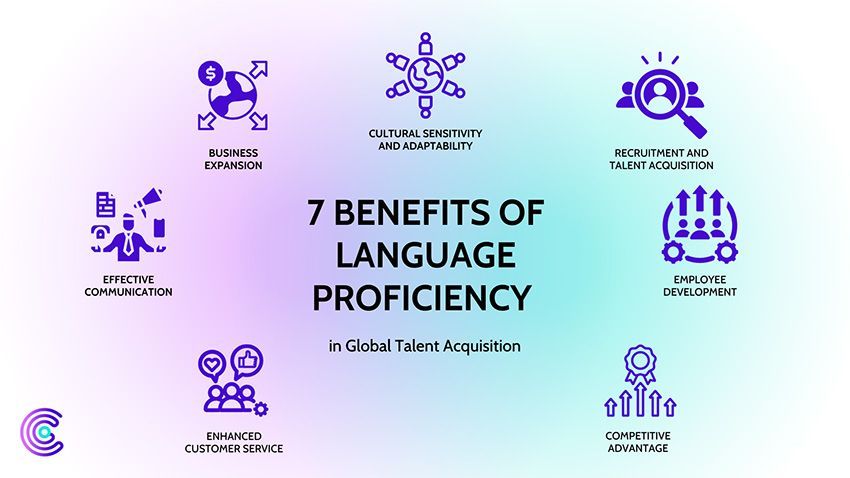Recruiting for the IT Industry? Pay Attention to Language Skills!
In the skills-based hiring revolution, language proficiency can’t be overlooked. Clear, articulate communication is essential to business growth and is foundational for any organization operating in the global marketplace. A multilingual workforce eases entry into new markets, enables remote work, and supports cross-cultural collaboration, all essential drivers of business success.
Language proficiency is particularly meaningful in the IT and business services industry as talent is widely distributed across geographies.
However, even among highly skilled teams and forward-thinking companies, language can still hinder progress. Most companies now
factor language proficiency into their overall hiring strategy, prioritizing candidates fluent in one or more languages based on current clientele or demand projections.
Considering the trend toward remote work and globally distributed teams, companies not hiring for language proficiency may be missing opportunities and limiting their view of what’s ahead despite clear indicators of what’s driving market growth.
The Demand for Bilingual Professionals in the IT and Business Services Industry
Today’s globalized work environment requires a bilingual or multilingual workforce, and nowhere is this more critical than in IT and business services.
Rapid digital transformation are driving exponential demand for skilled professionals at all levels of the industry. From the help desk to DevOps and beyond, companies need cutting-edge talent to help drive process efficiencies, comply with regulatory frameworks, and provide a secure, high-quality user experience through every touchpoint.

There is little possibility that any of the above objectives can be met unless all stakeholders communicate well.
Businesses leverage outsourcing and offshoring to reduce the cost of accessing the skills and talent they need, but if language is a barrier, they may not achieve the desired results.
Even if a company’s talent is entirely in-house, language barriers with customers and colleagues can prevent business development.
For example, help desk reps may be highly skilled, but there’s no value if they can’t communicate their knowledge to the customers. Customers today have little patience for poor experiences, and most will not hesitate to take their business elsewhere if they feel misunderstood.
Even a high-performing DevOps team may not deliver the desired result if the message gets lost in translation. Say for a company in the UK looking to develop an application with a specialized team in Poland: if the technicians
don’t fully understand the customer’s objectives because of a language barrier, it could result in costly delays, frustration, and revenue loss for both the client and the development company.
In another example, let’s consider a globally distributed team. For the team to perform well, they need to be able to communicate openly, which requires more than just technical acumen. Without a standard of language proficiency, misunderstandings or missed signals can lead to revenue loss, poor morale, and higher turnover, putting companies at a competitive disadvantage.
In the consulting field, forward-thinking companies actively seek expertise where it lives. Communication technology, cloud resources, and virtual reality have effectively removed barriers to working with experts in remote and far-flung regions, democratizing knowledge and supporting growth in new and exciting ways. Such access has enabled innovation in medicine, education, communications, fieldwork, and defense, helping people access unique knowledge and develop skills more easily.
However, no matter how easily we can make these strategic connections, no advancement would be operationally possible without understanding. Language will always be the essential enabler as it can transcend the technical to help people achieve true alignment.
Current Situation with Foreign Language Proficiency in the IT and Business Services Industry
In all the above scenarios, language proficiency is a glaringly critical component. Industries facing talent shortages have benefitted greatly from the ability to access a global talent pool. In all cases, hiring preference is overwhelmingly slanted toward bilingual or multilingual candidates. Many companies are turning to language assessments to improve their recruitment, enhance company culture, and add value to their bottom line.
Today, outsourcing, offshoring, and near-shoring are standard practices. Doing so allows companies to access specialized skills without the expense and risk of recruiting full-time employees. However, language can still be a barrier, even when other skills match the profile. Given the option, most companies will prefer candidates that meet their language requirements.
Data collected from US employers show:
And while European markets typically show broader language proficiency, the demand for English-speaking employees is now more vital than ever. Online job postings in the EU show explicit non-native language requirements, with English and German being the most requested.

According to the International Center for Language Studies, Mandarin Chinese is one of the most desirable and useful languages for tech professionals.
The Importance of Language Skills-Based Hiring
Knowing how language proficiency breaks down barriers between companies, their customers, and within cross-border teams, it’s clear that language assessment should be implemented during the hiring process. Doing so supports optimization in efficiency and candidate quality, especially for roles where language proficiency and communication skills in a specific language are key elements.
A language-proficient workforce gives companies a clear advantage, to compete at the highest levels of global industry and open doors to growth opportunities that wouldn’t otherwise be possible.
Companies with culturally diverse workforces are
more innovative and profitable—and while cultural diversity isn’t always associated with language proficiency, we must consider the rise of cross-border teams to understand the intrinsic connection.
Skills-based hiring has
proven its value in helping employers access a broader talent pool of quality applicants and providing existing employees with opportunities for internal growth. When we prioritize language proficiency in the job criteria, the benefits multiply, adding cultural relevance and paving the way for deeper understanding between companies and those they serve.
Integrating Language Assessments into Recruiting Strategies
In recruitment, language assessments can be easily integrated into hiring workflows to quickly identify candidates with desirable language skills. In talent development, language assessments can be conducted to highlight existing employees who would benefit from additional training.
Prioritizing language skills in the initial recruitment phase adds value to the process, reducing recruitment errors while fostering a more inclusive, diverse, and
internationally relevant work environment.
Companies should consider integrating a
language proficiency assessment tool like Pipplet when reviewing recruitment strategies. Pipplet’s assessments are offered in more than 40 languages, enabling businesses to tap into the potential of international markets.
Analyze language needs across the organization to understand what language skills your teams need to succeed. Doing so helps establish clear, measurable goals in an effort to provide employees with what they need to excel in their work.
How can Pipplet help?
Pipplet is an online language assessment tool that evaluates written and spoken language skills in over 40 languages. Available as a standalone platform or through integrations with HR and recruitment software, Pipplet enables companies to hire and develop language-proficient workforces at scale.
Pipplet is a subsidiary of ETS (Educational Testing Service), the creator of some of the world’s most trusted assessments—TOEIC®,
TOEFL®, and
GRE®—and drives pioneering research, development and innovation in measurement and learning.
Related stories









